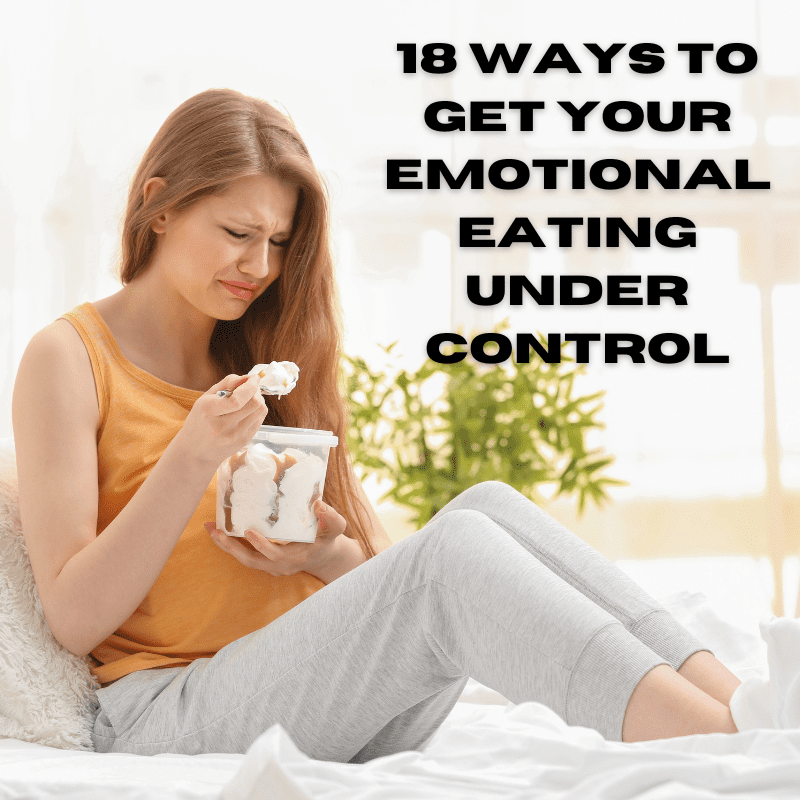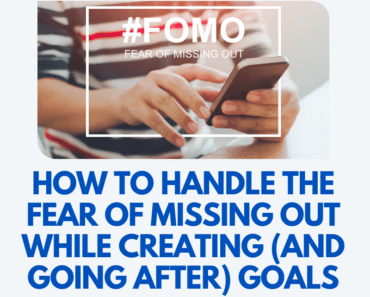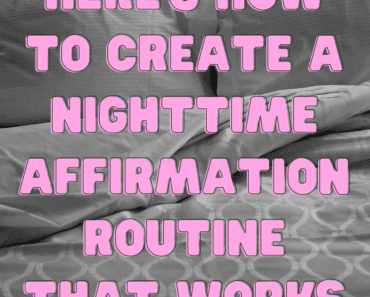Last Updated on July 31, 2022 by Christin
Emotional eating is the tendency to eat in response to emotions, such as stress, boredom, or anger. It can be a difficult habit to break, but it’s important to remember that food is not the solution to your problems. If you’re struggling with emotional eating, here are some tips to help you get it under control.

One note: A lot of people say that the following tips might be easier said than done, but that’s the whole point. If they were easy, you wouldn’t be reading this article. So cut yourself some slack, and know that even if you can only implement one or two of these tips, it’s still progress.
1. Keep A Journal Of Your Eating Habits
Keeping a journal of what you eat can help you to become more aware of your eating habits and triggers. Once you know what sets off your emotional eating, you can start to make changes.
It can be as simple as jotting down what you eat and drink throughout the day, or you may want to track additional information such as portion sizes, calorie counts, and how you feel after eating.
Over time, you will be able to identify patterns in your eating habits and see where you may need to make changes.
For example, you may notice that you often overeat when you are stressed or that you tend to snack more when you are bored. By becoming aware of these patterns, you can begin to make healthier choices that will help you achieve your goals.
2. Identify Your Emotional Triggers
Everyone has emotional triggers – certain things that set off a strong emotional reaction. These triggers can be positive or negative, and they vary from person to person.
If you’re not aware of your triggers, they can catch you off guard and cause you to react in ways that you might later regret, such as emotional eating. That’s why it’s important to take some time to identify your emotional triggers. Once you know what sets you off, you can be ready to deal with your reactions in a more constructive way.
There are a few different ways to identify your emotional triggers. One is to pay attention to your body’s reaction when you’re feeling emotional.
Do you tend to feel tense or anxious?
Do your muscles tighten up?
Do your heart rate and breathing quicken?
Noticing physical changes can be a helpful way to identify when you’re starting to feel emotional.
Once you know what sets off your emotions, you can start working on managing your reactions to these triggers.
3. Find Other Ways To Cope With Your Emotions
Instead of turning to food, find other activities that help you to cope with your emotions.
One way to do this is to express yourself through writing or art. The best way to go about this is to just let yourself go and not worry too much about what you’re producing. Just allow the words or brushstrokes to flow out of you without thinking too much about them. And if you’re worried that your work isn’t good enough, remember that there’s no such thing as bad art – only art that hasn’t been finished yet. So go ahead and get those feelings out – you’ll be glad you did.
You can also try exercises like yoga or meditation to help you relax. While it may seem like yoga and meditation are all about calming the mind, they can actually be quite powerful tools for managing emotions.
When we feel angry, anxious, or stressed, our bodies tend to tighten up, both physically and emotionally. Yoga and meditation can help to release that tension and enable us to express our emotions in a more constructive way. In yoga, each pose helps to open up the body and release any built-up tension. At the same time, the focus on the breath helps to calm the mind and bring about a sense of inner peace.
Similarly, meditation enables us to step back from our thoughts and emotions and observe them without judgment. This can help us to see our feelings more clearly and develop a more positive relationship with them. As a result, yoga and meditation can both be helpful in managing emotions.
If you’re feeling angry, go for a run or punch a pillow.
The key is to find activities that help you release your emotions in a productive way. By doing so, you’ll be better equipped to deal with whatever life throws your way.
4. Avoid Keeping “Trigger” Foods In The House
If you know that certain foods are your trigger foods, it’s best to avoid keeping them in the house. If they’re not there, you can’t eat them!
One way to do this is to simply not buy the food when you’re grocery shopping. If it’s not in the house, you won’t be tempted to eat it.
Another option is to keep the food in a place that’s not easily accessible, like on a high shelf or in a cabinet that’s hard to reach. This way, you’ll have to make a conscious effort to get the food, which will give you time to talk yourself out of eating it.
Finally, you can give the food away to someone who doesn’t have the same problem with trigger foods. Whatever method you choose, avoiding trigger foods is a key part of eating healthy.
5. Make Sure You’re Eating Regularly
Skimping on meals can actually lead to emotional eating. When you’re hungry, your blood sugar levels drop and your body produces the hormone cortisol, which can trigger feelings of stress. As a result, you may be more likely to reach for unhealthy comfort foods when you’re feeling run down.
To avoid this trap, it’s important to make sure you’re eating regular meals. Planning ahead can help – pack a healthy lunch or cook dinner in advance so you have something nutritious to eat when hunger strikes.
And if you find yourself snacking more often than usual, take a step back and make sure you’re getting enough protein, fiber, and healthy fats at meal times. These nutrients will help keep you feeling fuller for longer and curb cravings later in the day.
6. Make Healthy Choices
When you do eat, make sure you’re making healthy choices. Fill up on fruits, vegetables, and lean proteins. Avoid processed foods and sugary snacks.
1. Be mindful of your hunger levels. Ask yourself if you’re really hungry, or if you’re just eating because you’re bored or stressed out. If it’s the latter, try to find something else to do that will take your mind off of food, like reading or going for a walk.
2. Make sure you’re eating healthy foods. When you do eat, focus on nourishing your body with healthy items like fruits, veggies, lean protein, and whole grains. These foods will give you sustained energy throughout the day, so you won’t be as tempted to snack on unhealthy junk food.
3. Drink plenty of water. Sometimes we think we’re hungry when really, we’re just thirsty. Make sure you’re staying hydrated by drinking at least 8 glasses of water per day.
4. Avoid trigger foods. If there are certain foods that always make you want to binge, try to avoid them altogether or keep them out of the house. This way, you won’t
7. Don’t Diet
Many people diet in an effort to lose weight, but the ironic thing is that dieting can actually lead to weight gain.
One reason for this is that dieting often triggers emotional eating. When we deprive ourselves of food, our bodies go into survival mode and begin to crave high-calorie foods. This can lead to binge eating, which can sabotage our weight-loss efforts.
Additionally, emotional eating can lead to feelings of guilt and shame, which can further trigger binge eating. If you find yourself struggling with emotional eating, it may be helpful to speak with a therapist or counselor who can help you develop healthy coping strategies.
8. Exercise Regularly
Exercise is a great way to relieve stress and make yourself feel better. When you exercise, your body releases endorphins, which can help to improve your mood.
Endorphins are hormones that are released by your body in response to stress or pain. They work to block out the negative feelings and give you a sense of pleasure or euphoria. In other words, they can help you to feel better in difficult situations. And best of all, you don’t have to turn to food to get your fix of endorphins.
Exercise is a great way to release endorphins, and so is spending time with friends or pets.
9. Get Enough Sleep
If you’re tired, you’re more likely to turn to food for energy.
Research has shown that not getting enough sleep can lead to overeating and weight gain. This is because lack of sleep increases ghrelin levels, which promotes hunger, and decreases levels of leptin, which helps to control appetite.
In addition, sleep deprivation can lead to cravings for high-calorie foods. So if you’re trying to avoid emotional eating, it’s important to sleep enough. Aim for seven to eight hours per night, and you’ll be less likely to make unhealthy food choices when you’re tired.
10. Drink Plenty Of Water
Drinking plenty of water is often praised as a way to help with weight loss, but it can also be helpful in avoiding emotional eating.
When we get thirsty, our body’s natural response is to crave food, even if we’re not actually hungry. This is because the brain can mistake thirst for hunger, causing us to eat when all we really need is a glass of water. By staying properly hydrated, we can avoid this confusion and make it easier to resist the urge to snack.
In addition, water helps to fill us up and can even reduce cravings for sugary drinks or unhealthy snacks. So next time you’re feeling the urge to emotional eat, try reaching for a glass of water instead. You might be surprised at how effective it can be.
11. Avoid Alcohol
Alcohol consumption is often linked with emotional eating, as it can lower your inhibitions and make you more likely to indulge in unhealthy foods.
Additionally, alcohol can itself be a trigger for emotional eating.
If you find that you tend to overeat when you drink, cutting back on alcohol consumption can help you to avoid emotional eating.
12. Distract Yourself
Studies have shown that when we’re bored or uncertain about what to do next, we’re more likely to turn to food for comfort. That’s because eating provides a temporary sense of pleasure and satisfaction.
However, it’s important to remember that emotional eating is not a sustainable solution for managing our feelings. In fact, it can often make us feel worse in the long run.
Therefore, if you find yourself reaching for food when you’re feeling bored or restless, try distracting yourself with an activity instead. Go for a walk, call a friend, or read a book. By redirecting your attention, you’ll be less likely to give in to emotional eating.
13. Chew Gum
Studies have shown that chewing gum can help to reduce stress and anxiety, which are often triggers for emotional eating.
In addition, gum can help to keep your mouth busy and occupied, making it less likely that you’ll reach for snacks out of boredom.
So, the next time you’re feeling tempted to indulge in an unhealthy snack, try popping in a piece of gum instead. It just might help you avoid an unwanted binge.
14. Brush Your Teeth
One surprisingly effective strategy is to brush your teeth. The act of cleaning your teeth helps to signal to your brain that you are done eating for the day.
It also helps to remove any tempting food smells from your mouth, making it less likely that you’ll reach for a snack.
15. Wait 10 Minutes
If you’re like most people, you’ve probably experienced the urge to eat when you’re not really hungry. Maybe you had a bad day at work or got into an argument with a friend. Whatever the reason, emotional eating can be a tough habit to break. But there is one simple trick that can help: wait 10 minutes before giving in to your cravings.
During that 10-minute period, try to distract yourself by taking a walk, reading a book, or calling a friend.
Oftentimes, the urge to eat will pass during that time and you’ll be able to avoid making an unhealthy choice.
And even if you do end up eating something, wait 10 minutes before reaching for seconds. Chances are good that you’ll feel satisfied with the first serving and won’t need more.
16. Avoid Eating In Front Of The TV
If you’re trying to avoid emotional eating, one of the best things you can do is to avoid eating in front of the TV.
When you’re focused on a show or movie, it’s easy to lose track of how much you’re eating. You might not realize it, but you could be consuming hundreds of extra calories without even realizing it.
Additionally, eating in front of the TV can also lead to mindless snacking. You might find yourself reaching for unhealthy snacks simply because they’re within easy reach.
By avoiding eating in front of the TV, you can help yourself become more mindful of what you’re eating and make better choices when it comes to food.
17. Eat Slowly
When we’re feeling stressed or unhappy, it’s easy to turn to food for comfort. We might not even be aware that we’re doing it, but reaching for a snack can be a way of coping with negative emotions. The trouble is that emotional eating often leads to overeating, which can, in turn, lead to weight gain and other health problems.
One way to avoid emotional eating is to eat more slowly. When we eat quickly, we’re more likely to eat too much before we realize it. By slowing down, we’re more likely to pay attention to our body’s hunger cues and stop eating when we’re full.
We’re also more likely to savor our food, which can help to prevent cravings later on.
18. Practice Mindful Eating
Mindful eating is a practice that can help us to be more aware of our thoughts and feelings around food, and it can help us to break the cycle of emotional eating.
When we eat mindfully, we allow ourselves to be fully present in the experience of eating. This means being aware of the taste, texture, and smell of our food, as well as how our bodies feel as we eat. We also pay attention to our emotions and thoughts without judgment. This can be a challenge at first, but with practice, it gets easier.
If you find yourself turning to food when you’re feeling down, try taking a few moments to eat mindfully. Slow down, savor your food, and pay attention to how you’re feeling. You may find that you’re not actually hungry, or that you’re able to control your portions better when you’re paying attention to your body’s cues. Mindful eating can help us to make healthier choices overall, both physically and emotionally.





